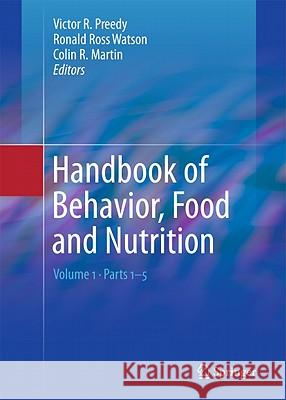Handbook of Behavior, Food and Nutrition » książka
Handbook of Behavior, Food and Nutrition
ISBN-13: 9780387922706 / Angielski / Twarda / 2011 / 2094 str.
This book disseminates current information pertaining to the modulatory effects of foods and other food substances on behavior and neurological pathways and, importantly, vice versa. This ranges from the neuroendocrine control of eating to the effects of life-threatening disease on eating behavior. The importance of this contribution to the scientific literature lies in the fact that food and eating are an essential component of cultural heritage but the effects of perturbations in the food/cognitive axis can be profound. The complex interrelationship between neuropsychological processing, diet, and behavioral outcome is explored within the context of the most contemporary psychobiological research in the area. This comprehensive psychobiology- and pathology-themed text examines the broad spectrum of diet, behavioral, and neuropsychological interactions from normative function to occurrences of severe and enduring psychopathological processes. This book addresses limitations in other works that may individually look at a one-way or unidirectional relationship between food and behavior. It examines, in the context of bidirectional relationship at multiple levels, the connection between food and behavior. For example, it examines at both preclinical and clinical levels, from genes to populations, (a) how components in food will affect our behavior and sensory responses and (b) how our behavior and sensory responses affect what foods we eat, their pattern of consumption, and so on. In other words it truly bridges the transdisciplinary divide. The book consists of approximately 100 chapters (it is anticipated that chapters will be added to the current roster), conveniently divided into seven sections representing the various subdisciplines and speciality areas, namely:
- General aspects
- Eating and food choice
- Mental tasks and performance: influence of diet
- Obesity and dieting
- Eating disorders
- Organic pathologies and interrelationships with eating
- Changing eating behavior and attitudes











